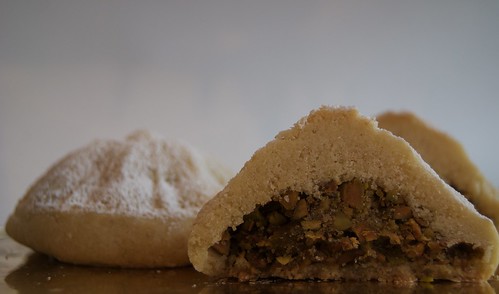In a Maine airport shop, I beeline for the local food souvenirs, my eye roving from a set of Stonewall Products over to several local blueberry jams. More than I expected, in fact. One comes from Out on a Limb, a small home jam making operation that got started thanks to Maine’s cottage food law.
Today about 30 states have so called “cottage food laws,” allowing legal home-based food production on a small scale. The alternative is renting a commercial kitchen, which can cost $10 per hour, more often $25 or higher. Many of the laws passed recently thanks to grassroots efforts by bakers and jam makers eager to generate extra income, build a food community, control their cooking environments, and / or work at home. State guidelines differ, usually prohibiting riskier foods such as refrigerated items.
Of course, where food is concerned, law changes are about as easy as a croque-en-bouche (whose cream filling would make it a no-no). As a petition gathers momentum in California, along with a Facebook group, I took a look at a few food entrepreneurs operating under cottage food laws in a time where local food reigns and career “Plan Bs” have become more like Plan A. (The San Jose Mercury News also wrote about the California petition.)
In fact, about 40 people a day contact Denay Davis, who supports home bakers. She says. “They have lost their job and want to make ends meet by making extra money,” she says. “They don’t want a huge business. If you’re a mom you may want to be able to stay home, make cakes, and sell them when you want to. You’re bringing in money. But you’re also there for your children.”
However in most states, proponents have faced uphill battles. Two key objections tend to pop up:
1) It’s not fair to businesses who invest in commercial facilities.
As with the food truck versus restaurant battles, yes it’s more competition. I was thinking about a baker in Los Angeles who makes beautiful decorated cookies out of her bakery. If suddenly hundreds of home bakers could do the same without the overhead she might possibly need to drum up more commercial business to keep the bakery going.
But it’s also worth looking at the positive economic impact. Davis believes “little food crafters are simply not a threat. It’s about sharing with other people, having control, and building relationships–not making a killing. Etsy sellers exemplify typical cottage food law businesses, although many states only allow selling home-made goods locally, not online. Says Davis, “It’s about scratch, or quality, or specialized products, not making the $29.99 sheet cake that competes with a commercial bakery.”
Retirees can supplement limited incomes. Says Beth-Ann Betz who bakes Middle Eastern pastries, “If this was my only income I’d be earning about 40 percent of what I need. I didn’t have to make any capital investments. It’s a nice retirement job for me.”
The laws also help those needing gluten-free or nut-free environments. Michigan baker Julie Rabinowitz explains: “We’re gluten-free at home. So it’s easier to bake with confidence at home, without having to pay hourly to scrub someone else’s kitchen free of gluten.” The Michigan law caps her Tasty Sans Gluten sales at $15,000. It’s a delicate balance Commercial kitchens can run $1,000 or more per month, or $12,000 a year. “My farmers market customers worry about price increases when I move to a commercial kitchen,” she adds.
Anni Minuzzo, California food consultant and former biscotti company owner likes the idea of a cap. “It’s more fair to businesses who start out paying for a kitchen.” A cap also forces those who have outgrown their home kitchen to expand. While Lori Jordan enjoys balancing family life with her at-home Out on a Limb jam business, she knows that “in the future if we want to grow beyond New England, we will have to move to a bigger place and hire more people.”
I wonder how much new food will crop up that isn’t already being given away, swapped, or sold underground.
2) It’s not safe and clean.
The laws generally require the same FDA Good Manfacturing Practices required by larger food businesses. Many call for ServSafe food safety certification, no pets, and defined cleaning procedures (see Arizona‘s). “New Hampshire has a good model,” says Betz. “I have a dishwasher, clean water that is tested, and ServSafe certification.”
Kelly Masters, owner of Cake Boss software, started her Texas cake business at a kitchen the Health Department had scored highly. But, she says, it “was so unclean that I would sometimes come home crying. I didn’t even want to sell cakes I made there.” Kelly went on to advocate a Texas’ cottage food law (passed Sept. 2011).
Several years ago, Davis contacted all the departments of agriculture. “None had received sickness reports,” she says, adding that with very small batch production in all likelihood only a few people might be affected. Most or all states require a label to the effect of “made in an uninspected home kitchen,” letting the buyer beware.
Says Lori Jordan of her jams, “Maine requires us to have the same inspections, insurance, and file all the same paperwork as if we were a commercial kitchen.”
One retailer who has seen a few questionable home food processors feels the rules should allow for spot inspections, unannounced–resulting in self-regulation. Farmers’ markets could charge to inspect home kitchens. And a new industry for a third-party inspection services could arise, contributing further business license and tax revenue.
Craft the Best Laws, the Crafters May Follow
While cottage laws are a blessing, they tend to have shortfalls, often odd limitations on allowed foods. For example, Wendy Read, who I thought might switch from a commercial kitchen to home, for make her Sunchowder’s Emporia jams says: “If you are selling on the internet and / or can products outside of jam such as vegetables, you can’t take advantage of the new law.”
Worse yet, some counties’ rules may not sync with the state law. While Cyndi Jacobs makes The Best Damn Granola in a commercial kitchen, she observes that despite Massachusetts’ state cottag food law “there are a lot of local boards of health that will not allow home-based baking. More and more they are telling people the products need to be make in licensed facilities.”
Some believe a nationwide law is the answer. Says Davis, “the cottage food initiative is something for the first time that doesn’t benefit just an individual but a family, and a community, and a state.”
Having costed out starting my own occasional food business, I learned first hand how getting started on a small scale at home makes sense while proving the market. Seeing an array of local jams at the airport rather than only brands you can find everywhere makes a place special. More flexible but smart laws to keep the home fires burning are a good thing, these days.
FYI: How to advocte a cottage food law in your state
Cottage food laws: What do you think? Nationwide or local? Fewer or more guidelines? Have you heard of any problems?








Susie Wyshak- Great article and thanks for the link-bake. It is going to take a lot of wonderful articles like this one to get folks understanding the importance and benefit of buying local homemade food products from macro business owners. Small business can have a profound impact on a local economy if enough people are aware. Again, great article!
Thanks Denay! You are doing a great service to many. 🙂
Susie
Thank you for sharing information on the burgeoning issue of cottage food laws. Hoping to see one in California soon, just like the Texas Baker’s Bill (now The Texas Baker’s Law). 🙂